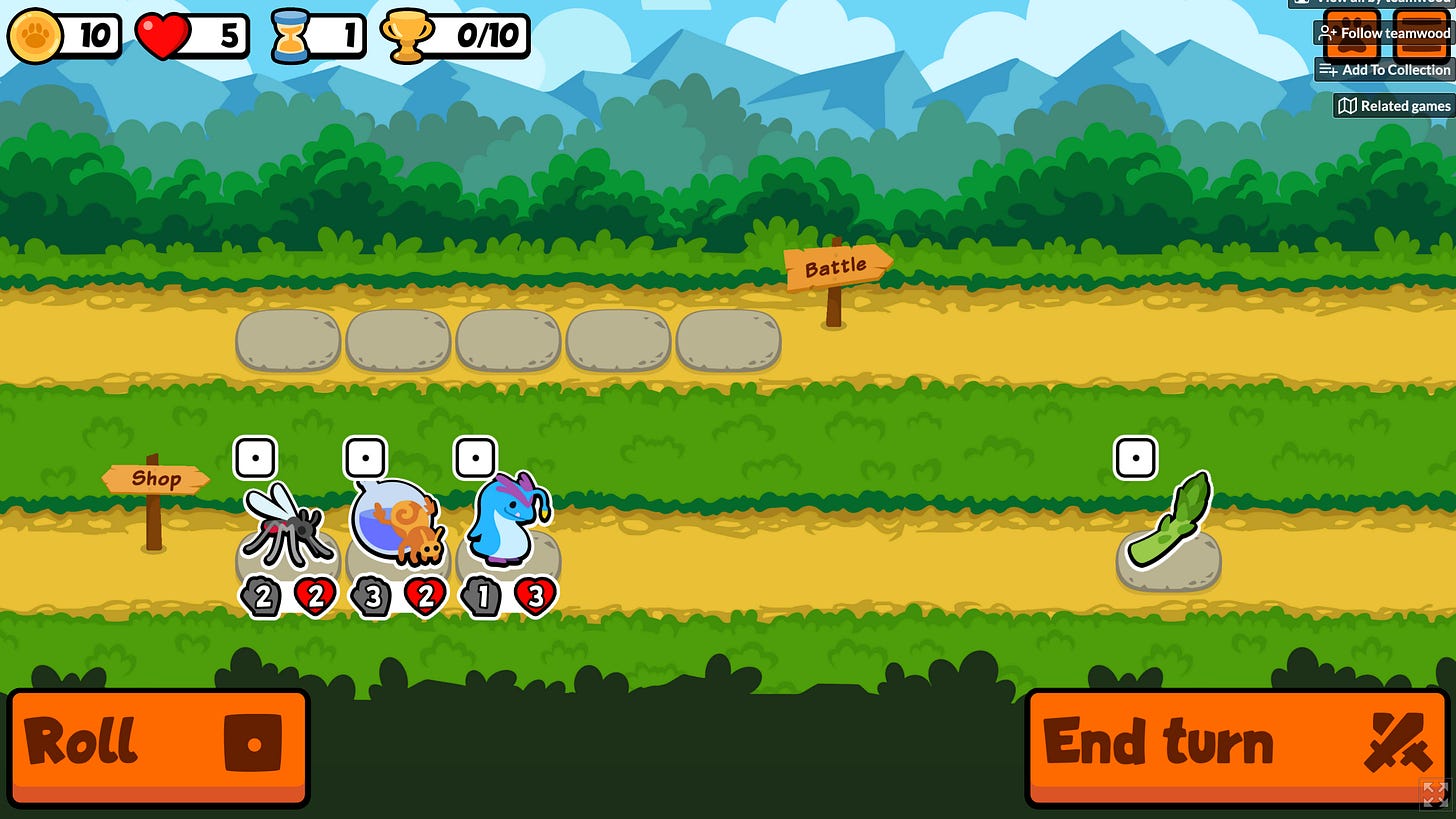Ghosts Inside the Competitive Machine
How the latest generation of digital card games let you battle against players who aren't even there
Imagine a training montage. Instead of battling a generic AI, the main character gets their pick of historical enemies. They can train their skills against specific tactics and behaviors, understanding not just the optimal move, but the move that enemy would make.
This might sound like something out of science fiction, but in the competitive online card battler space, that’s the exact type of experience. Card games like Once Upon a Galaxy! and Bazaar use historical copies of real players’ past “builds” (the deck they constructed) for future players to play against. It’s an innovation that feels new and fresh, and wholly out of science fiction.
What’s not surprising, though, is what genre the innovation is happening. Since the genre was created (or at the very least solidified) by Magic the Gathering it’s been a source of a dizzying array of innovation and new ideas. This is probably a combination of the size of potential revenue, Magic alone made over $1 billion in 2022, and also how enchanting card game style mechanics are for erstwhile designers.
Other people have done a better job of talking about the breadth of history of the “deckbuilder” genre, but for now I just want to focus on the most recent iterations.
The Problems
But just because it’s a lucrative and interesting design space, doesn’t mean that success is easy, by any stretch of the imagination. In order to be successful games have to outcompete other new entrants, existing games (Magic is still absolutely chugging along after 30 years and Hearthstone is about as successful as ever) and paint a compelling vision for why you should play it.
Luckily, there are a few core problems that modern, digital card battlers have that are waiting to be solved:
Upfront Scale: In order to find a player of the correct skill level you have to have a ton of players all ready to play at once. Otherwise you're going to end up with poor match ups and long wait times.
Time to Play: Related to number one, you often have to set aside a good chunk of time in order to actually play the games. There's no "setting your computer aside" once you get started. This creates a high barrier for entry where you need dedicated time to get in the game.
Casual Ranked Play is Rough: The semi-competitive experience is rough: It is far and away my biggest pet peeve about Magic: The Gathering Arena. If you were semi-decent you would quickly move up the ranks of the ladder only to start getting absolutely destroyed by the people who actually spent their time playing games.
Solution: Ghost Battles
The solution is to have players play against copies of past opponents, rather than directly compete with the opponents in a timed match. It’s an evolution on the autobattler, described below, but it takes a step more abstract. Instead of playing against an opponent who is drafting in the same group as you, you’re playing against an opponent who roughly has a team at the same level of skill that you do.
The innovation here is that at no point are you actually “playing” against another player who’s at the computer at the same time as you. You’re competing against a copy of someone who was playing at some point, but whose team has been saved as a record for future consumption.
But what is an Auto-battler? (or Auto-chess)
Auto-battlers, popularized by Auto-chess variants of DOTA 2 and League of Legends represent a pinnacle of sorts of the drafting style card game popularized by Magic. Instead of competing strategically, you act as more of a manager, building a team of increasingly strong units, and then compete (typically 1-1) against other opponents, watching your teams battle each other, and then using the money you earn between rounds to improve your team, until only 1 player remains.
This sort of drafting mechanism is a great fit with a genre (Card Games) that is already prone to things like deck building, card selection, and other pick and choose style ideas.
Once Upon a Galaxy!
In the game you’re drafting cards into a two row, five slot board, where you have front line and back line cards that will have to work together to strategically attack and defend until you or your opponents are out of creatures. If you lose, you lose a heart. The goal is to be the last player standing. Once Upon a Galaxy! feels like Storybook Brawl1 took notes from Marvel Snap! and spawned a new version of itself for mobile.
Card games feel like a great fit for phones because they're portrait mode and require a lot of the sort of drag and drop interface that works well on phones. The big challenge with phones is that unlike with computers we don't typically dedicate long periods of time to playing on them. Often we'll pick up and put down the phone multiple times. This presents a challenge for competitive games where thoughtful play and matches can require focus and dedication.
Instead of shrinking the game length, it eliminated the need for simultaneous play altogether. And by grouping the ghosts together (you’ll play against the same set of copies over the course of a draft experience) you get the sort of unified competitive journey that you might find in other competitive games, but with the ability to pick up or put down your phone as needed. You are, after all, only playing against ghosts.
If we take a look back at the “problems to solve” we can see how the ghost players reduce upfront cost by allowing one player’s run to be re-used multiple times across play experiences, thus lowering the scale needed to have a healthy variety of game play, the time dedication being lowered because you can put the game down, and the casual play experience being enhanced because your competitive group is a puzzle to unlock.
The downside I've found in these games is that playing at the end can feel somewhat anticlimactic. Because you're not making tactical decisions against another opponent often at the end you'll either become so obviously powerful that the final player is a cakewalk, or vice versa, they've "gone off" as it were and you find yourself absolutely steamrolled. There are very few tense back and forth matches at the end, at least in my experience.
Bazaar
Bazaar, built by a Hearthstone streamer, feels like it's a game made for streamers. You collect a variety of creatures, artifacts, energies, and ability in order to, I believe, deal more damage to your opponent than they do to you. As the video below shows it’s a far more complex game than Galaxy! and a game designed for computer first over mobile.2
It takes the concepts of an auto-battler, and then mixes in solo and competitive play. Most of the time you'll be playing against computers, but the game will mix in ghosts from past runs of other players at the same moment in their run. It's the sort of idea that adds a bunch of variability to the experience, knowing that the competition against other players acts as a sort of skill check.
This focus on "the run" feels like it's aimed directly at streamers. It has the layout and the flashy animations that Hearthstone is famous for, but with even more numbers jumping around that gives that slot machine vibe that the best runs of Balatro have. It combines those single player vibes of a unified, smooth experience with the competitive atmosphere of a two player card game.
Taking a look back at the “problems to solve” for Bazaar we can see how it went a slightly different direction. By creating a more single player experience, the upfront scale cost was lessened because you don’t need a large body of players to make a single run fun, by making it a game you can jump in and out of you can set aside the right time to play, and by making the moments of player interaction highlights interspersed with monster battles, other players feel like bosses to overcome rather than an overwhelming force or skill check you can’t hope to compete with.
Who Is Making The Games?
It doesn’t seem like an accident that both of these games are being developed by former professional streamers (Bazaar) or competitive Magic players (Once Upon a Galaxy!). The innovations each game has are the sorts that require a deep knowledge of the ins and outs of what makes these games fun (and the tuning required to keep them logically consistent) as well as with the built-in audience and following that can start the games off on a successful foot.
It also doesn’t hurt that Magic: The Gathering was such a deep and rich game that people are still finding ideas to slice off and turn into smaller, more focused gaming experiences.
Future Releases and Competitive Play
I think this idea of playing against copies or ghosts or past players is only going to expand in the future with additional refinements. I am curious if this sort of play pattern will remain within the realm of turn-based and card games or if it will expand into other types of competitive experiences as computing power increases over time.
Ultimately, for both of these games, the big questions for me are:
What will the competitive play experience look like?
How will new content fit into the game?
How do they plan on making money?
Both of these games feel like they have the type of foundation to become stable, popular competitive games and I’m excited to see what the future holds for them.
Storybook Brawl is a cautionary or unfortunate (depending on how you look at it) tale of what happens after you get purchased by a crypto company (FTX) and then collapsed when it collapsed. Ultimately I think it’s a story about the tenuousness that all game companies face and just how hard it is to actually become successful making games and then turn that success into money.
This isn’t to say you can’t or won’t play it on mobile, but it’s a more natural fit for the “streamer at a computer” experience than Once Upon a Galaxy!






